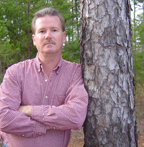
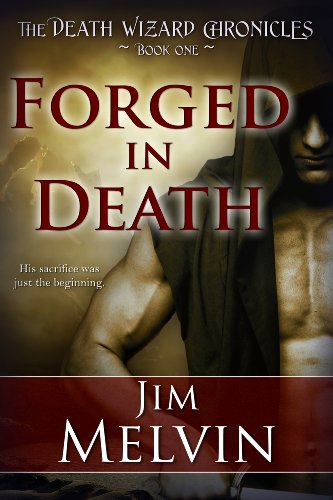
Jim Melvin has been a friend of mine for more than twenty years and, for as long as I’ve known him, his driving interest has been writing an epic fantasy series, something that might find shelf space alongside J.R.R. Tolkien’s Lord of the Rings trilogy.
But life kept getting in the way.
He was married, raised two wonderful daughters, had a full-time job as an editor at the St. Petersburg Times, and did all the other good stuff that eats up time and interferes with achieving those very personal dreams we all entertain.
But that’s life, right?
Well, a few years ago, Jim decided it was now or never. He retired from the newspaper, took his family and savings, and moved to North Carolina. He put everything else aside to fulfill what he believed to be his destiny and nearly two- thousand pages that became The Death Wizard Chronicles.
The first book in the six-book epic fantasy was released in September by Rain Publishing, and a new installment will be delivered to bookstores every thirty days until the entire series is available in February 2008.
It’s a hell of a story, a hell of a series, and Jim Melvin is a hell of a guy.
Jim Melvin Website • The Death Wizard Chronicles blog • Facebook • Goodreads • YouTube • LinkedIn • Order Blinded By Power, The Death Wizard Chronicles, Book Five from Amazon.com
Is Pali real? Look it up on Wikipedia here!
BOB ANDELMAN/Mr. MEDIA: Jim, for everyone who knows you personally and your story, let me ask this as plainly as possible. What the hell were you thinking? You gambled an awful lot on your imagination.
JIM MELVIN: Well, Bob, I think it was sort of something that built up over 25 years. When I would get in the shower, when I’d drive in the car, when I would fall asleep at night, I would think about this series, and, to me, it felt like this is what Jim Melvin was supposed to do, to create this series. And so many people have dreams in their lives that they’re never able to achieve because of the reality of living and working and raising families and mowing the yard and maybe taking a break at night to watch a little TV that their dreams are set aside. I had an opportunity to live off savings for a couple years and to take this risk and, rather than bank the savings and retire at age 62 and write the book then, I wanted to do it in my late 40s when I had at least a little bit of youth left. I want to be able to look in the mirror and tell myself, “You gave it your best shot.”
ANDELMAN: Now, you can affirm to people that I did not exaggerate here. This has been living inside of you for years. And pretty much everyone who’s known you, family, friends, co-workers has been aware of this, right?
MELVIN: It’s actually been living inside of me probably since I was a little boy. I grew up in St. Petersburg, Florida, and I lived on a little island called Coquina Key. I was lucky to live on a street that had quite a few boys my age. And, like a lot of boys, we played football and baseball, and we ran around all day long, especially during the summer. One thing we did was we played a lot of imaginary games, and we would get together, five, ten of us and play for hours. And a lot of it was based on things like shows of that time period back in the late sixties, early seventies like “The Man from U.N.C.L.E.” and “Lost in Space.” And my imagination was almost as tantalized by fantasy and superheroes and magical powers, and so The Death Wizard Chronicles really were born then.
ANDELMAN: Had you written any of this as a teen, in college, any of that kind of stuff, or did it all come after you retired?
MELVIN: Well, when I was a teenager, about the age, say, of a junior in high school when you’re really finally starting to try to take seriously what you’re gonna do with your life, it just hit me really hard that I wanted to become a best-selling novelist. I remember even back then when I was what, 16, 17 years old, I was going around and telling people that I was going to be a best-selling novelist, and I was gonna make $75 million. And that’s in the mid-1970s, so that’s probably $300 million of today’s dollars.
Then I thought, well, I’m not a rich person now. I need to make a living at least until the first novel hits big. What should I do? Well, I decided then to become a journalist because journalists write. I’ll learn the craft of writing even though, at that point, when I was young, I was so arrogant I really didn’t think I needed to learn the craft of writing.
I actually wrote a novel. It was a horror story, kind of a Stephen King-type thing. Stephen King was just coming out at that point. I shopped it around some, and it came actually relatively close to being published. But, at the time, and all writers hear this, that it’s usually not the first book that hits it big. It’s the second or third book that hits it big. So I wasn’t really concerned that the first book didn’t get published. I knew the second one would, only then I began working 50-hour weeks and six-day weeks. And I got married, and I had kids, and I had a house to take care of, and there never was a second book. But for 25 years, The Death Wizard Chronicles were in my mind, and I did try to attempt to write it several times. I would get 30 or 40 or 50 pages into it, and then just it would stop. I would either lose momentum, or I didn’t like what I was doing. As it turned out, the real reason I didn’t write it wasn’t the excuse of working too hard or having a family, it was that I really, as a writer and as a person, wasn’t ready for it. And journalism and living my life, you meet a lot of people, and you have a lot of experiences, and you learn a lot of things. You do learn the craft of writing. And over the years, I became a more worldly, more mature person, more capable of this. And so actually, in the long run, it really turned out for the best because now is my time.
ANDELMAN: I’m recalling, as you’re saying that, that a couple years before you retired from the newspaper that — correct me if I’m wrong — you had taken kind of an interest in Eastern philosophy and things like that. Am I on the right track here?
MELVIN: That’s correct, actually. The Death Wizard Chronicles actually were based on Eastern philosophy even before I knew much about Eastern philosophy. It’s just sort of a coincidence. I got divorced and remarried, and my second wife was a long-time Buddhist, and she introduced me to Buddhism. It was a religion that I really embraced. I embraced the religion in a philosophical sense. It really spoke to me in terms of the tools it offers to live your life. And once that happened, I think all the pieces fell into place.
ANDELMAN: It’s in the very first book, The Pit — there’s a reference to karma.
MELVIN: Right. Karma, in the Buddhist sense, is the philosophy that all of your actions, whether it good, bad, or neutral, have effects. Good actions create happiness. Bad actions create unhappiness. And neutral actions basically don’t do anything. What you are is an accumulation of your karma.
One of the other aspects of Buddhism that most attracts Westerners to Buddhism is meditation. Through meditation, you’re able to relax, slow your heart-rate, and also begin to see certain truths that are all intertwined in Buddhism. My main character is called a “Death Wizard” because he’s able to meditate so deeply that he literally stops his heart and temporarily dies. And there’ve been studies with Tibetan monks that have shown that when they’re through long stretches of meditation, they can slow their heart rate to like under 10 beats per minute or even less. Well, my character can take that to the extreme, and when he dies, he temporarily enters the realm of death and enriches himself with magical powers.
ANDELMAN: Since you mention the Death Wizard, this might be a good time to tell people listening and reading a little something about the series, six books. And you can’t use the whole half-hour for the synopsis.
MELVIN: Well, it’s difficult to do a fantasy synopsis, and I’ll tell you why. But imagine giving a synopsis for Lord of the Rings. You would say very short people with hairy feet save the world from monsters. That doesn’t sound that interesting. But I’ll give it a shot.
My series is, as you said, it’s six books. It’s about 700,000 words, which sounds like a ton, and I guess is, but there’s a lot of fantasy, very popular fantasy, written now-a-days that is quite a bit longer. For instance, there’s someone named Steven Erikson who’s doing a ten-book series called The Malazan Book of the Fallen, and each one of his books are about 300,000 words. So 700,000 words now-a-days is pretty average in the fantasy world.
But, at any rate, my series involves a character who is called a Death Wizard, and actually throughout the series, he’s actually more accurately called a “Death-Knower.” And he’s called a Death-Knower because he literally dies and returns. He has seen what happens when you die, and none of us, of course, have ever done that. And the crux of being a human being is being aware of our own mortality.
The evil character that he combats throughout the series is called a “Sun God.” And he’s called that because he derives his power from sunlight. If you get into the world of Carl Sagan, suns and stars are the creators of life in the universe. Our bodies are made of things that come from the stars. So this creates a paradox in my series in that the good character is based on death, which human beings traditionally see as being a bad thing, and the evil character is based on life, which human beings traditionally see as a good thing. The entire series revolves around that paradox with a lot going on between the lines.
ANDELMAN: And folks, as I said, he’s been thinking about this for a long time. So, Jim, are any of these characters, are they based on real life? Is there anybody that you want dead?
MELVIN: Well, Torg, my main character is seven feet tall and weighs 300 pounds and is really good-looking so I based him on me. I would say that none of the characters are really based on anyone I know. Obviously, all of your life experiences create characters that you write, but they’re not based on people that I know. But they are characters that, very intensely, I’m sure this happens to most writers, but very intensely, I’ve grown to love them. And in fact, right now, I’m in the editing process of Book Six, and when that completes, I’m gonna feel kind of sad. I’m gonna feel like I’ve lost some family.
The series, for the most part, takes place over a thousand years, but the vast majority of the series really only takes place over about a four-month period. Anytime in fantasy, when you write fantasy, you have to try your best to interweave backstory because backstory creates context that gives your characters meaning. Once I’ve gotten most of the backstory out of the way, it’s really just a rollercoaster ride to the finish of good versus evil, wars, fortresses, castles, monsters, vast amounts of magical power, and it’s kind of sexy too and R-rated. So this is not Harry Potter. This is not recommended for kids or even young adults. This is an adult, R-rated series, which again, a lot of the most popular fantasy now-a-days is.
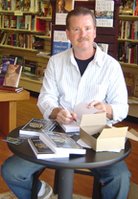
ANDELMAN: You’re a dad, and you’re a dad a second time around. What is an appropriate age group? Was thinking do you need to be at least in college or high school to read this?
MELVIN: Well, as we all know, some 15-year-olds are as mature as 25 and vice-versa, but I would certainly say 18 and above. And I’m sure there are adults who are very conservative who would find this at least mildly offensive, and then there are young adults who probably wouldn’t. But I would certainly recommend 18 and above. I’m not out to offend anyone, and I want to be honest up front. You never, of course, want to lose potential customers, but I don’t want to offend anyone either.
ANDELMAN: Right. You mentioned this. There is some rougher sexual content.
MELVIN: Yeah. It’s funny. When you write sexual scenes, you’re writing it just like you write anything else. You’re writing it one word at a time, one page at a time, and you’re dissecting it in a very kind of bland, scientific sense. So when you’re writing it, it seems not the least bit offensive. But then you find when people read it, it has a much different effect on them than it did on you as the writer, and it’s kind of surprising. I’m just gonna have to wait and see how that plays out.
ANDELMAN: Once you got to the third and the fourth book and the fifth and the sixth, did you have to go back to the first couple of books and make some tweaks? Did you find your style changing, or was it meshing? From the writing point of view, how did you adapt?
MELVIN: That’s a very good question, actually. And it’s a good question mainly for the reason that this really is my debut as a novelist, and I didn’t have 15 novels under my belt and a style firmly established. I certainly had a style established as a writer cause I’d written a lot for the newspaper, but fiction is a different animal. And so my style did evolve. In fact, you never want to sell yourself short, but this series actually gets better as it goes along. Book Two is better than Book One. Book Three is better than Book Two all the way across the board. Part of that probably is because my style evolved.
Another part of it is that’s just the way the story goes, and also because the first two books and especially book one had to have more back-story, which tends to slow things down a little bit.
But the bad news for me early on, once I got my agent, was that I began getting rejections from the first wave of large publishers. And large publishers now-a-days, first-time fiction is a very difficult sell. They might have one opening a year for 5,000 or more entries. But the good news was, because it took me two or three years to finally secure a publisher, it gave me the time to go back. I could be in the middle of Book Four and then go back into Book One and add some foreshadowing or change something or tweak something or decide, “This character in Book One isn’t quite as consistent as he is in Book Four.” And so now, the quality of Book One, in that regard, is as strong as Book Six. And a lot of fantasy writers, especially the big guys who are releasing one after another and Book One is out while they’re writing Book Two, can’t go back into Book One and can’t go back into Book Two. And so I’ve been able to do that, and it has created a very strong sense of continuity.
ANDELMAN: How much of the book was written before your agent started trying to sell it, and how much of it was written by the time it finally sold?
MELVIN: When I first started the series, as I’ve said now several times in the interview, I played it out over and over in my mind. And I knew scenes, and I knew characters, and it really started to pour out of me, but still, I didn’t start out knowing that I had a six-book series. I thought that I actually might’ve had only one very long book, like about a 1,000 to 1,200 page book. And I knew that I wanted to write a long prologue, maybe about a 30-page prologue. Well, the 30-page prologue became book one, which is 300 pages. That’s when I knew things were starting to develop. Well, as soon as I finished Book One, I began querying agents and very quickly got one. And so I started book one in September of 2004 and secured an agent in February of 2005.
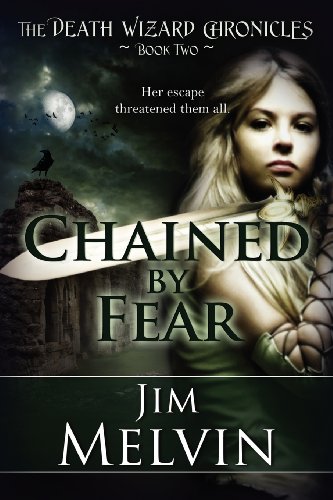
ANDELMAN: How much was written at that point?
MELVIN: At that point, 300 pages were written. Book one is, by far, the shortest of the books. Again, it’s only 300 pages. The rest of the books are all about 500 pages or in the 525 to 550 range. So only 300 pages were written, and I think that was part of the reason that it was a tough sell to the major publishers because, again, I’m a first-time guy. Not only are they taking a risk with a first-timer, but they’re even taking a risk that I’m gonna finish it.
ANDELMAN: And by the time Rain Publishing acquired it…
MELVIN: I signed my contract with Rain in March of this year. By that point, I had written the first draft, I believe, of Book Five.
ANDELMAN: Wow. They knew what they were getting, and you knew what you had.
MELVIN: Exactly. Yeah, exactly.
ANDELMAN: So I have to ask. After all those years of waiting and dreaming what it was gonna be like to hold a Jim Melvin novel in hand, how did it feel? What was that day like when the book arrived for the first time?
MELVIN: You actually said something to me when you and I were talking several years ago about this, about how when you’re finished with a book, you’re really not finished. It’s just the beginning of the work. So I assume that everyone would think that when you’re holding the book in your hand that it’s this incredible, marvelous experience, and it is in some regards. But your mind is so occupied with all the other things you have to do that you still almost don’t feel like it’s finished because you know how much hard work it’s gonna be to get people to even know that the book exists and to read it.
ANDELMAN: You’re just getting started with all that. You’re starting the interviews. You’re gonna start doing book festivals and all that kind of stuff.
MELVIN: Yeah. I’m in one book festival already. I’m close to two others. I’ve got, I believe, six or seven book appearances, and I’ve got another three or four that are virtually official. I also have a lot of friends in the newspaper business all over the country. I’ve been contacting friends in hopes of getting first in line in terms of reviews and features. It’s all starting right now, and unless, again, you’re with one of the mega publishers who have the mega marketing machines behind them, there’s a lot of marketing involved. There’s a lot of hard work, both by your publisher and by you, and the more work you put into it and the harder you go at it, the better things are gonna be. All that said, it’s gonna be several months before I really see how much this pays off in the tangible sense.
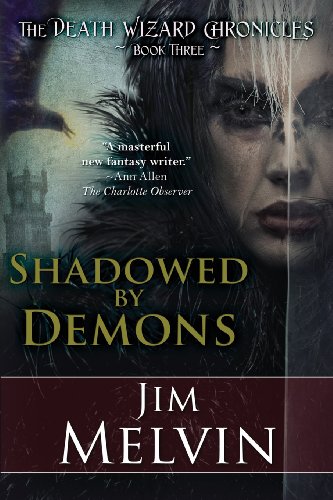
ANDELMAN: Did you ever think about just writing a simple novel instead of okay, here are 300 pages, and it shows that I can write a beginning, a middle, and an end rather than commit. Holy cow! We talk about it almost casually, but the decision you made to just put everything aside and commit to this thing — it’s really an amazing story.
MELVIN: Well, thank you. That goes back to what we discussed earlier about having this opportunity to sort of step out of the rat-race. I had really been in the rat-race, in my opinion, since about 12 years old. I started mowing yards when I was 12 years old. Then I started frying chicken, and then I started working at restaurants. I went through college in about three and a half years and went to work at age 20. And I was in the rat-race, like I say, from age 12. Well, now suddenly, here I am about 46. I don’t have to work, and I said to myself, “Jim, if there’s ever a time that you’re gonna achieve your dreams and write the story that you want to write, now is the time to not blow this,” and I didn’t.
That said, once the series is done, I think I’m gonna do exactly what you just suggested. My next book, I think, is gonna be a relatively average-length stand-alone, probably either in the horror genre or now-a-days, apparently vampires and werewolves and that kind of thing are really popular and easy sells. So that will probably be my next project. I’m definitely not gonna write another six-book series unless The Death Wizard Chronicles were to become a big hit, and then prequels and sequels were a request that I would certainly love to do that.
ANDELMAN: Sounds like fun. Sounds like a good thing. How did you deal with people over the last couple years as you weren’t writing? You were writing, but you weren’t working at a traditional kind of thing. I’m sure people asked, “What do you do?” and you’re like, “Well, I stay home and I type.”
MELVIN: Well, basically, I immediately started calling myself a novelist, which I guess is accurate. I didn’t necessarily say published novelist, but I said novelist, which became my identity. And that actually felt really good to me because, like I said, basically from certainly my junior in high school year on, that’s who I was. I really wasn’t a journalist. I wasn’t a reporter. I wasn’t a designer. I wasn’t a supervisor. I was a novelist, and it felt good to say that.
Is Pali real? Look it up on Wikipedia here!

 The Party Authority in New Jersey, Pennsylvania, Delaware and Maryland!
The Party Authority in New Jersey, Pennsylvania, Delaware and Maryland!
